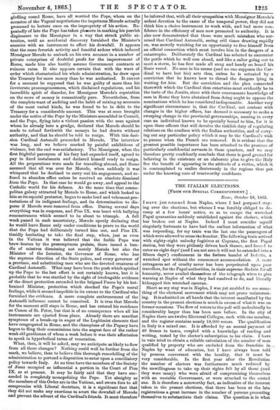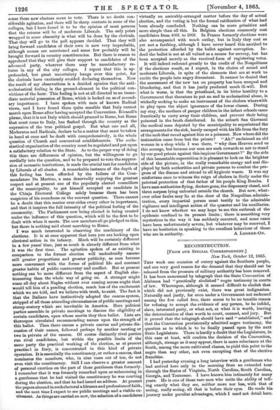THE ITALIAN ELECTIONS.
[FROM ODD SPECIAL CORRESPONDENT.] Rome, October 18, 1865.
I HAVE just returned from Naples, where I had purposed stay- ing over the elections, but whence I was forcibly obliged to de- camp at a few hours' notice, so as to escape the wretched Papal quarantine suddenly established against the cholera, which has broken out at Naples. Indeed I must consider myself singularly fortunate to have had the earliest information of what was impending, for my train was the last one the passengers of which were allowed to cross the frontier. The following train arrived with eighty-eight unlucky fugitives at Ceprano, the first Papal station, but they were pitilessly driven back thence, and forced to enter an eight days' (and I am not sure it will not be extended into a fifteen days') confinement in the forlorn hamlet of Isoletta, a wretched spot without the commonest accommodation. A more outrageous act of cruelty never has been perpetrated upon poor travellers, for the Papal authorities, in their supreme disdain for all humanity, never availed themselves of the telegraph wires to give warning at Naples of what they had resolved to do, and literally kidnapped this wretched caravan.
Short as my stay was in Naples, I was yet enabled to see some- thing of the electoral movement which may not prove uninterest- ing. It is admitted on all hands that the interest manifested by the country in the present elections is much in excess of what it was on former occasions. The flow of voters to the poll will undoubtedly be considerably larger than has been seen before. In the city of Naples there are twelve Electoral Colleges, each with one member, and the register contains nearly 18,000 voters. The qualification in Italy is a mixed one. It is afforded by an annual payment of 40 francs in taxes, coupled with a knowledge of reading and writing, tested by the elector's subscription to his claim. I have in vain tried to obtain a reliable calculation of the number of men qualified by property who are excluded from the franchise in Naples by want of education, but I have always been told by persons conversant with the locality, that it must be very considerable. In the first year after the Revolution the number of electors was furthermore much reduced by the unwillingness to take up their rights felt by all those (and they were many) who were afraid of compromising themselves with an unstable Government, or were attached to the ousted one. It is therefore a noteworthy fact, as indicative of the interest taken in the present elections, that there has been at the late registrations a great increase in the number of persons presenting themselves to substantiate their claims. The question is in what
sense these new electors mean to vote. There is no doubt con- siderable agitation, and there will be sharp contests in some of the colleges, but I have found it to be the opinion of most persons that the returns will be of moderate Liberals. The only point wrapped in some obscurity is what will be done by the clericals.
That they will go to the poll appears decided. That they will bring forward candidates of their own is now very improbable, although names are mentioned and some few probably will be brought forward in country constituencies. But there is reason to apprehend that they will give their support to candidates of the advanced party, wherever there may be unsatisfactory re- turns in any of the city colleges. I repeat that this is ap- prehended, but great uncertainty hangs over this point, for the clericals have cautiously avoided declaring themselves. Now the result of my observations is a decided opinion that the anti- ecclesiastical feeling is the ground-element in the political con- victions of the hour. This feeling is not at all directed to an imme- diate material possession of Rome, which is looked on as of second- ary importance. I have spoken with men of known Radical views, and I have found them quite sensible that Italy cannot march upon Rome after having accepted the Convention. R icasoli's phrase, that it is not Italy which should proceed to Rome, but Rome that must come to Italy, has flashed through the country as the expression of the true political gospel. But what one and all, Moderates and Radicals, declare to be a matter that must be taken in hand at once and be dealt with comprehensively, is the whole question of Church and conventual establishments. The eccle- siastical organization of the country must be regulated and put upon a satisfactory relation to the State. As to the proper way of doing this there are differences of opinion, but the willingness to go cordially into the question, and to be prepared to vote the suppres- sion of monastic institutions, is made the crucial test for candidates by Liberals of all shades. A remarkable instance of the depth of this feeling has been afforded by the failure of the Corn- mendatore De Martino, a man deservedly enjoying the greatest respect and at present one of the popularly elected councillors of the municipality, to get himself accepted as candidate in the Chiaja Electoral College solely because there has been suspicion of his soundness on the convent question. There cannot be a doubt that this matter over-rides every other in importance, and that it inspires the full intensity of the political feeling of the community. The Parliament now being elected is being created under the influence of this question, which will be the first to be dealt with when it meets. The new members all go pledged to this, but there is nothing said about marching to Rome.
I was much interested in observing the machinery of the elections. It is at once apparent that here you are looking upon electoral action in its infancy. Much will be certainly different in a few years' time, just as much is already different from what it was the first time. The agitation spoken of as existing in comparison to the former election will undoubtedly assume still greater proportions and greater publicity, as men become more conversant with the forms of political life and contract greater habits of, public controversy and conflict. But at present nothing can be more different from the aspect of English elec- tioneering than the whole way of going on. A stranger might roam all day about Naples without ever coming across aught that would tell him of a pending election, much less of the excitement which we are told, and we believe with truth, to exist. The fact is that the Italians have instinctively adopted the caucus system, stripped of all those attending circumstances of public meetings and stump oratory which are inevitable in America. Here political parties assemble in private meetings to discuss the eligibility of certain candidates, upon whose merits they then ballot. Lists are thereupon circulated recommending names upon the strength of this ballot. Then there ensues a private canvas and private dis- cussion of their names, followed perhaps by another meeting or two in private of the caucus. Of course distinctly rival parties run rival candidates, but within the possible limits of the same party the practical working of the election, as at present practised in Italy, is concentrated in this kind of private operation. It is essentially the constituency, or rather a caucus, that nominates the members, who, in nine cases out of ten, do not even visit the constituency. Still I can observe a greater amount of personal exertion on the part of these gentlemen than formerly. I remember that it was formerly remarked upon as unbecoming in a gentleman that he had visited the constituency he was courting during the election, and that he had issued an address. At present the papers abound in such electoral addresses and professions of faith, and the next time I expect to see public meetings and a visible ex- citement. As things are carried on now, the selection of a candidates virtually an amicably-arranged matter before the day of actual election, and the voting is but the formal ratification of what had been already concluded. Nothing can be more primitive and more simple than all this. In Belgium elections commonly cost candidates from 4001. to 500/. In France formerly elections were also accompanied with much outlay, but in Italy they cost as yet not a farthing, although I have never heard this ascribed to the protection afforded by the ballot against corruption. In- deed the ballot is not at all valued as a means for secrecy, but has been accepted merely as the received form of registering votes.
It will indeed redound greatly to the credit of the Neapolitans if the elections result, as I expect, in the choice of sound and moderate Liberals, in spite of the elements that are at work to excite the people into angry discontent. It cannot be denied that the assessment of the new tax on property has been unequal and blundering, and that it has justly produced much ill-will. But what is worse, is that the priesthood, in its bitter hostility to a Government that threatens to put an end to ecclesiastical abuse, is wickedly seeking to make an instrument of the cholera wherewith to play upon the abject ignorance of the lower classes. During my stay, the mothers of pauper children in the infant schools came frantically to carry away their children, and prevent their being poisoned in the broth distributed. In the suburb San Giovanni the medical man deputed by the municipality to superintend the arrangements for the sick, barely escaped with his life from the fury of the mob that raved against him as a poisoner. Now where did the insinuation come from but the priests? " Ah l" exclaimed an old woman in a shop while I was there, " why does Heaven send us this scourge, but because our men are such cowards as not to stand by our good priests against this impious Government ?" By the side of this lamentable superstition it is pleasant to look on the brighter side of the picture, in the really remarkable energy and zeal dis- played by both authorities and private persons to combat the pro- gress of the disease and attend to all hygienic wants. It was my misfortune once to witness the reign of cholera in Sicily under the paternal protection of that father of his people King Bombs. I have seen authorities flying, doctors gone, the dispensary closed, and three corpses lying unburied outside the church. But now, what- ever other faults may lie at the. door of the Neapolitan adminis;- tration, every impartial person must testify to the admirable vigilance and intelligent action of the qusestor and his auxiliaries.. I do not know whether we may hope to see this outbreak of the- epidemic confined to its present limits ; there is something very mysterious in the way it has suddenly occurred, and some cases have been unfortunately severe, but whatever may be reserved, I have no hesitation in speaking to the excellent behaviour of those































 Previous page
Previous page